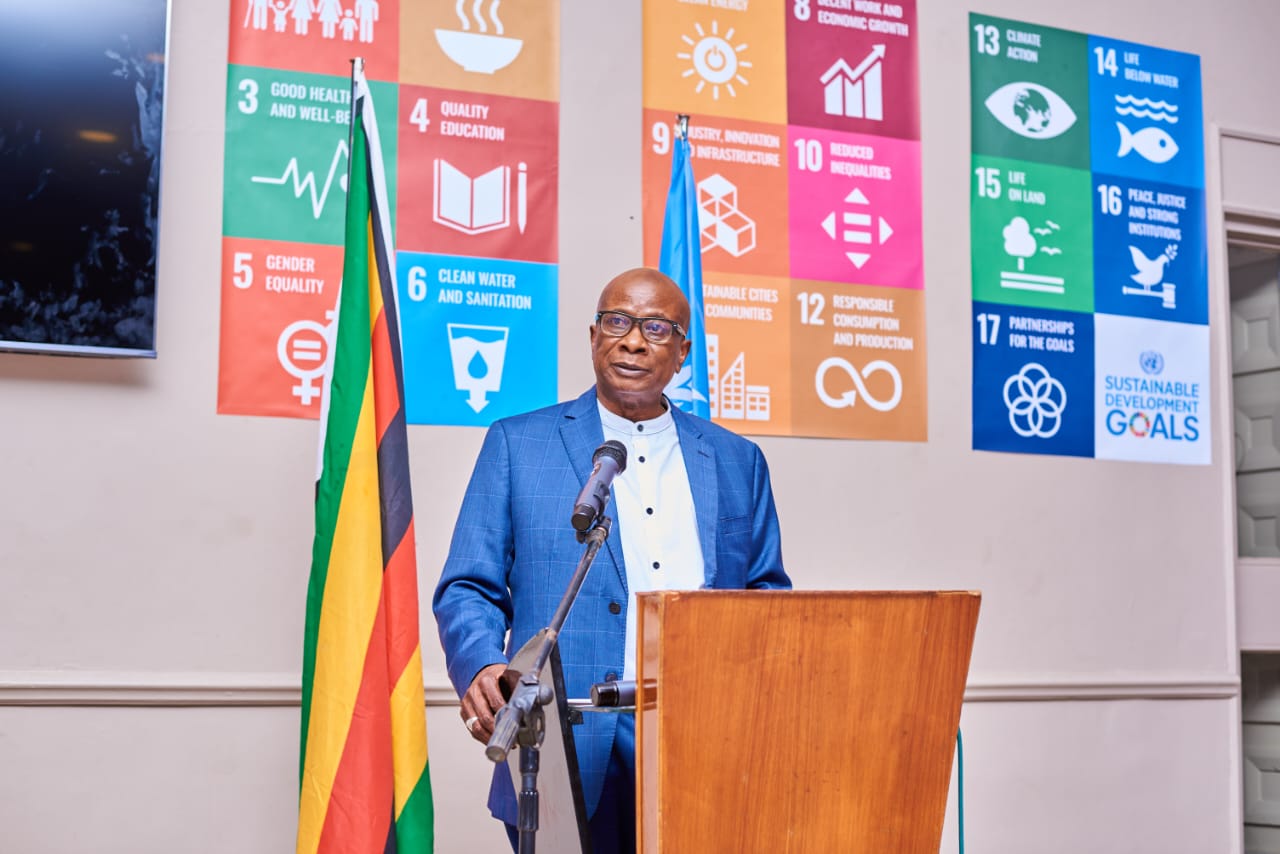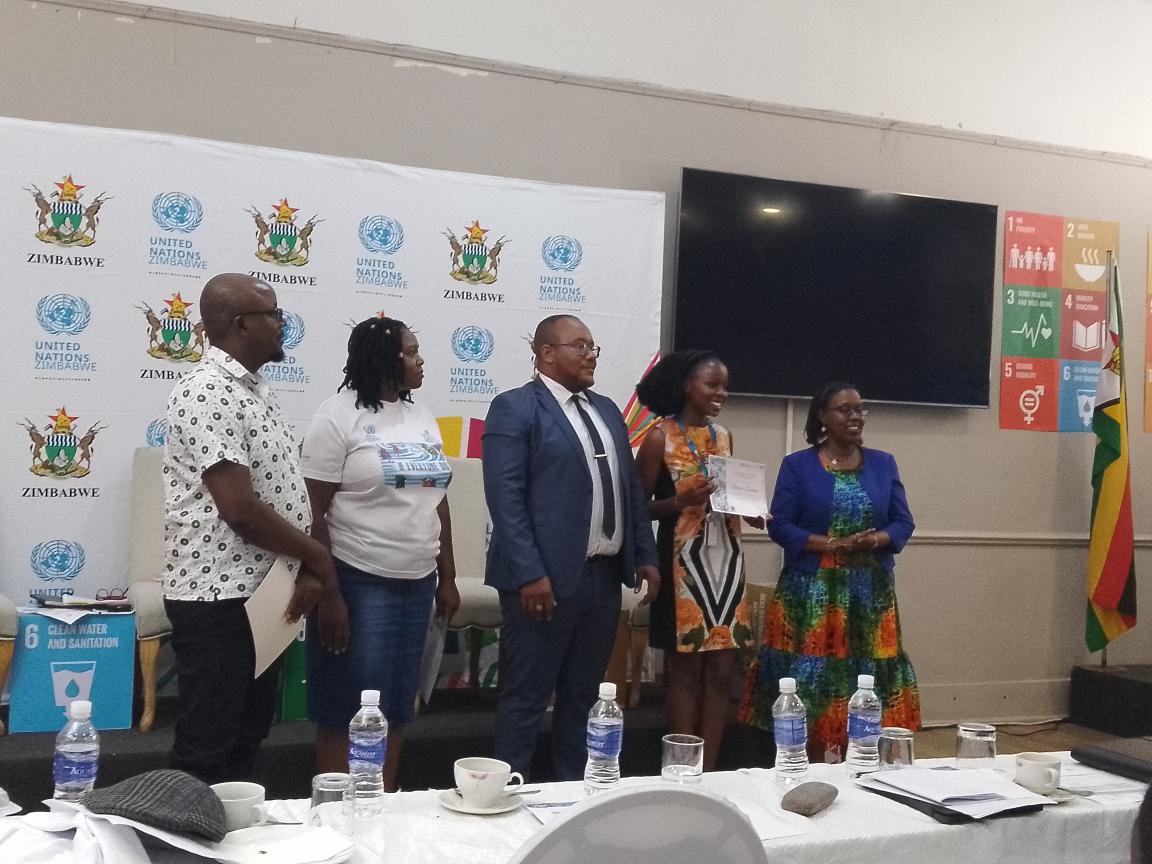|
Getting your Trinity Audio player ready…
|
Engaging youth in volunteerism brings countless benefits in fostering development, Hon Kudakwashe Mupamhanga, the Deputy Minister of Youth Empowerment, Development, and Vocational Training said at the Occasion of the Commemoration of the International Volunteers Day (IVD) today in Harare, the 7th of December 2023.
“In Zimbabwe work in volunteerism has been focused on the youth and the promotion of volunteerism amongst young people, this is due to the fact that the majority of our Volunteers in Zimbabwe are from the youth demographic. Engaging youth in volunteerism brings countless benefits for them as individuals, as well as benefits to the nongovernmental organizations and other stakeholders that they support and the communities that they live in.
“Today exists the largest generation of young people ever known creating unprecedented potential for economic and social progress. Technologies like social media and mobile phones have created a generation that is better connected than ever before, awakening in them a new sense of power and potential. Many of the 1.8 billion youth from across the globe aged 10-24 are located in developing countries, with these same countries the most likely to see continued youth growth beyond 2030. Young people are providing the energy, creative ideas, and determination to drive reform, and are demanding institutions that are more responsive to their needs and aspirations,” Hon Mupamhanga said.
He pointed out that young people also face challenges such as social exclusion, lack of rights, gender-based violence, poverty, and many other issues that must be overcome before young people are able to fully exercise their potential.
Addressing the same gathering, His Excellency Edward Kallon, UN Resident and Humanitarian Coordinator said by harnessing the intelligence, resources, and energy of the youth effectively, Zimbabwe can materialize its development strategy and vision to become an upper-middle-income society and achieve the SDGs by 2030.

“I would like to underline that with the full utilization of the talents and readiness of the youth to contribute to the best of their ability, Zimbabwe will be able to achieve the SDGs and realize its vision by 2030. There are factors that are crucial for youth to be the catalysts and drivers of peace and equitable and sustainable development,” Hon Kallon said.
He said providing affordable high-level education and skills development opportunities to the youth is essential for a developing country like Zimbabwe. This enables them to embrace modern technology and build capacity for self-sustaining growth. In addition, encouraging entrepreneurial aspirations among the youth unlocks their energy, intelligence, and resources, leading to the realization of the country’s development plans and vision. By empowering the youth to plan, decide, and work, they become better equipped to face life’s challenges.
HE Kallon said civic education plays a critical role in nurturing societal and national values. Fostering a culture of peace is crucial for meaningful coexistence in a world characterized by diverse personal, social, and cultural backgrounds. Possessing significant human values helps bridge differences and promote peace and solidarity. The hopes of young people can only be fulfilled in conditions of peace, within a civilized and cooperative national and global order.
He emphasised that the spirit of voluntarism and the active participation of youth are paramount, as they represent the powerhouse of a country. Recognizing problems and finding solutions, youth can become strong agents of socio-economic change. They also help other young individuals develop their intellectual abilities and become qualified adults.
Tied to this, HE Kallon said the participation of women as catalysts of development is crucial at both community and national levels. Integrating women successfully into economic, political, and social transformation processes ensures that investments in human capital benefit future generations. Recognizing that human capital is vital for economic growth and development, it is critical to prioritize high-level education and enhanced economic status for women and young girls to achieve long-term development objectives.
Caroline Majonga, a program officer with the United Nations Volunteers (UNV) said IVD celebrations are meant to amplify the importance of people-led solutions to common global challenges.
The campaign theme for 2023 is” If Everyone did…”. This campaign message focuses on collective action, our collective action, that if everyone did, If everyone volunteered, the world would be a better place for us all. This year’s IVD is a celebration of volunteerism while highlighting the ‘if’ is a way to motivate everyone to make their contribution.
In Zimbabwe work in volunteerism has been focused on the youth and the promotion of volunteerism amongst the young people.
“This is due to the fact that the majority of our Volunteers in Zimbabwe are the youth in this country. This is so for a number of reasons including that the majority of our population is constituted of young people, youth tend to be seeking opportunities formally and informally to be able to develop themselves and volunteerism is a key avenue through which this is done.
“Engaging youth in volunteerism brings countless benefits for them/you as individuals, as well as benefits to the organizations and other stakeholders they/you support and the communities that they/you live in. This year UN Volunteers has joined together with the Resident Coordinator’s Office (RCO), and partners Voluntary Service Overseas (VSO) and the UN Partnerships and Development Finance Taskforce to commemorate the International Volunteer Day (IVD) 2023,” Majonga said.
Farai Muronzi, the Executive Director of Restless Development said his organization works in line with the government of Zimbabwe in attaining SDGs. One of its areas of focus is SDG 3 on Good Health and well-being. Under this, they provide information and knowledge in hard-to-reach communities in Zimbabwe around Sexual Reproductive Health and Rights. They also mobilise communities for community outreach medical services and advocate for the provision of Sexual Reproductive Health services without discrimination
Restless Development also works on SDG 5 on Gender Equality by carrying out research on the causes and effects of GBV at the community level; working with communities to respond to GBV-related incidents; and supporting communities in coming up with community-led responses to gender-based violence.
Under SDG 8, it supports young people to get relevant skills to improve their livelihoods; offers training in business entrepreneurship, and managing a business among other areas; and links young people to microfinance support.
On SDG 13 on Climate Action, they are increasing youth knowledge and understanding of climate change; increasing the voice of young people in climate change; and showcasing the power of young people as a driving force in addressing climate change.
Jessica Rutendo Mutowongi has been volunteering for almost a year and quarter at the Voluntary Services Overseas (VSO) as a Monitoring and Evaluation Advisor for ACTIVE project.
“My Volunteering assignment is to work with the project staff to review indicators for monitoring and evaluating the progress of the ACTIVE project. M&E is an important function of a project and can serve as its backbone as it provides useful information about how the project is doing (e.g. what things are going well, what things are not going well, whether the project is on target in reaching expected milestones and outcomes, and where adjustments should be made). While there are some Excel-spreadsheet-staring moments, there is so much incredibly community rich experience.
“Ultimately, the information that is collected through M&E helps to tell the story of how ACTIVE project is helping to improve the livelihoods of the small holder farmers through empowering women and youths to have control over incomes and the right to food. It also aims on building the resilience of vulnerable populations so they can respond positively to potential shocks, helping people cope with current climate change, adapt their livelihoods, and improve governance systems and ecosystem health so they are better able to avoid problems in the future,” she said.
